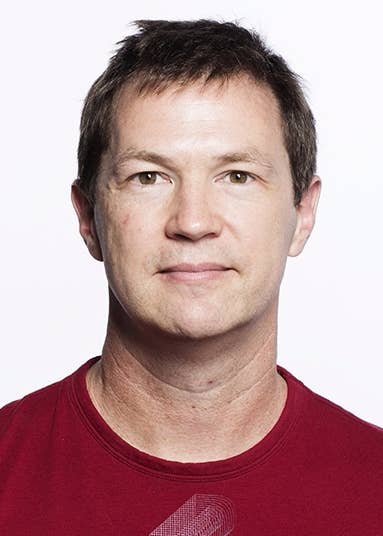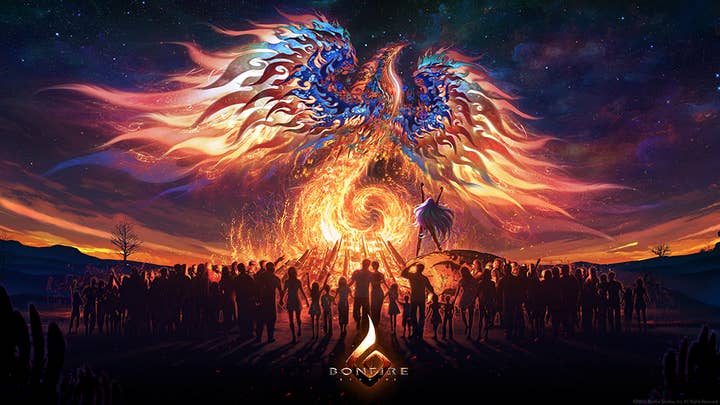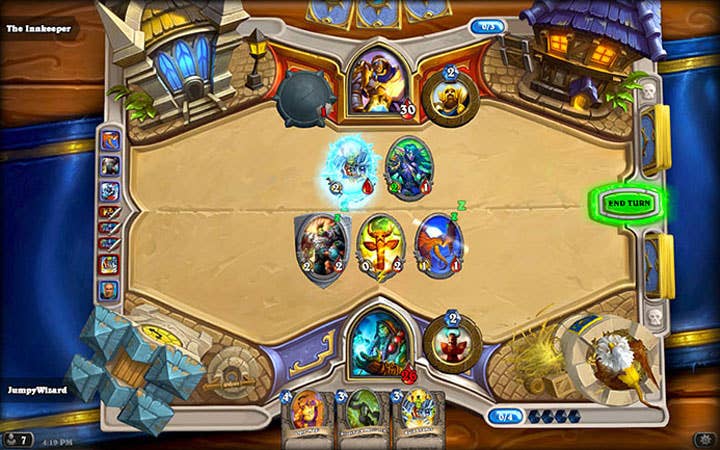Building Bonfire: Rob Pardo's plans for 2018 and beyond
The World of Warcraft lead designer discusses how his new studio is shaping up and plans to follow Hearthstone's success
It's been over three years since Rob Pardo left Blizzard and yet, after just a few minutes talking to him, you can tell it's a place he still holds very dearly.
In fact the vast majority of his keynote at View Conference, where GamesIndustry.biz caught up with the veteran designer, was spent reminiscing about his time at the World of Warcraft firm and the valuable lessons he learned there.
Those lessons, and a few former colleagues, are what he hopes will set his new venture on the path to greatness: Bonfire Studios.

"Intrinsically who I am as a game developer... it's hard to divorce any of the ways I think about that from Blizzard, since I feel like so much of what I learned about what works well in game development came from my time there, and working with all the amazing people there," he tells us. "A lot of those things are going to come over to Bonfire."
He shared some of those insights in his keynote, including the importance of not shipping a game until its ready and a process he refers to of "excellence through iteration" - although Bonfire isn't quite in a position to implement this just yet.
The studio has maintained an air of silence since it formed in July 2016. Pardo explains that this is because he has been taking the time to form the bedrock of any successful developer: a talented team.
"That's really been the number one focus," he says. "We've been picking away at things and prototyping some ideas, but the number one focus has been getting the right team into place.
"Who I am as a game developer... it's hard to divorce any of the ways I think about that from Blizzard. A lot of those things are going to come over to Bonfire"
"I've been a big believer over the years that if you have a great team, then they'll choose a game that really works with the strengths of that team. I'm not as big a believer in deciding on an idea and hiring people to go do that idea. So it's only been the last couple of months that I feel like we've been focusing a lot on software."
Recruitment efforts are already off to a great start. Pardo highlights a number of proven names among Bonfire's ranks, including former Blizzard cinematics whizz Nick Carpenter, ex-Nexon America CEO Min Kim, and Battle.net tech director Matt Versluys - to name but a few. Yet the studio boss is determined not to rush this process. Unlike start-ups that often need to produce their first product within a year, Pardo says he is in the fortunate position to take a little more time.
"We were able to raise enough investment dollars that we can go with this strategy," he explains. "We're not under the gun where we have to release six months to a year. What we really want to do is build that team, and right now we're going into a phase of heavy prototyping. And we're going to be prototyping multiple ideas, we're not going to settle on just one thing right away. What we really want to do is come up with a few different ideas, because every time you do a game design it may sound like the greatest thing on paper but when you actually stand it up, it isn't much fun to play. Once we find something that feels like it has a lot of potential, we'll really staff that team up and put it into a production mode."

This, he reveals, will be the priority for 2018. The current Bonfire team it working on a variety of different ideas, and has even prepared "pitch deck-type stuff" and presentations to explore them. They have selected a few to develop further and expect a couple of these to eventually have software prototypes built around them, earmarking a few months for each before deciding whether to continue or pivot that concept.
"Next year is going to be all about finding what it is that we feel like we want to build. It's hard to put exact time limits on things - we do want to have urgency, but we want to find something we really like."
"Next year is going to be all about finding what it is that we feel like we want to build," says Pardo. "It's hard to put exact time limits on things - we do want to have urgency, but we want to find something we really like.
"It's just about creating those milestones where we'll check in on the product - it almost feels like tech start-ups, but from a games standpoint, where you push something onwards and then work out if it's going well. If it's hit a dead end, maybe it needs to go in a different direction, or we need to go back to one of our other ideas.
"We have a really senior team that's shipped a lot of product so I'm not too worried about being in that phase forever. All of us know what it takes to ship something as well. It's great that we get to explore a bunch of ideas to find the one that's best suited to us, but ultimately we want to ship something."
Pardo is still largely unsure what that shipped product might be, or to which platforms it might be heading. So far the concepts are primarily for PC and/or mobile devices, with the CEO adding: "Our ideas are like half-and-half right now."
Bonfire has already said it intends to focus on online multiplayer experiences - specifically those that attract loyal and close-knit communities of gamers, much in the same way Blizzard's portfolio has.
"Even the name of the company, Bonfire, is a metaphor for the type of games we want to create," Pardo says. "Because what is a Bonfire? It's a place where friends gather, tell stories and grow closer together as friends. We want to create titles that have these communities that get behind the game and really last for a long time."
"You have to love making games and the process of making games, and not just be doing it because you're trying to beat whatever your last success was"
Telling stories is certainly a priority for Pardo - he was even invited to join a storytelling panel at View Conference, pondering the future of narrative alongside folks who had worked on everything from Blade Runner 2049 to the latest adaptation of The Little Prince. However, the games developer stresses that Bonfire isn't necessarily going to become a narrative powerhouse.
"I wouldn't imagine we are ever going to be a Naughty Dog that makes these amazing single-player narrative experiences - those games are amazing, but that's just not what we're going to focus on," he says.
"When we think about story from a Bonfire perspective, we're thinking about it more in terms of world-building. A good example is something like Overwatch - not a narrative-based game but they have tons of story in it, throughout the characters, artwork and environments. [Maybe] narratives will come into play [if] we want to do something that's more like an MMO and maybe there's more story... but I think story will always be in support of the gameplay."

Just the mention of an MMO sets the imagination wild - after all, this is World of Warcraft lead designer Rob Pardo (although he's quick to stress that WoW was the vision of a whole team, not just himself). Nevertheless, it illustrates how eagerly anticipated Bonfire's first project is likely to be given the AAA talent behind it. Does this add pressure for Pardo and his team?
"Hearthstone has really become a compass heading for Bonfire: doing stuff at that quality level and scope level"
"It is hard to have big success and then now you have all these expectations and you've got to do it again and again," he acknowledges. "Some of the games I've worked on were successful in overcoming that pressure, and other ones weren't. There are games I've worked on that got cancelled. You have to love making games and the process of making games, and not just be doing it because you're trying to beat whatever your last success was.
He continues: "Ultimately, you need to manage the community's expectations from the moment your start talking about your game. I think that's something we need to be really aware of. Right now, we're pretty far off from having something we can talk about concretely from a product standpoint but I think once we get to that point, we'll want to think about how we can set the right expectations. Because that can really hurt you when you get to the point of launching. It hurt Blizzard with Diablo III, it hurt Bungie with Destiny."
When Pardo and his colleagues first announced Bonfire, they declared it would be a place where developers would not have to choose between the quality of an AAA project and the creative freedom of indie development. In fact, it was his last Blizzard project that has convinced him this is the best way forward.
"Hearthstone had the same quality level of any of the Blizzard games, but it's a much smaller scope and we were able to do it with 15 developers," he says. "That's really become a compass heading for Bonfire: doing stuff at that quality level and scope level."
He goes on to explain that Bonfire is being partly modelled on the online card-battler's success - not just from a product perspective, but from a team and culture one, too.
"When you have a team of 200 people, it's almost like leading an army. How do you get communication done? How do you get an associate artist to feel like they're engaged in the game design? How do you get your leads, who are oftentimes your best individual contributors, out of meetings all day long so they can actually also contribute to the product?
"Can we have a studio of Hearthstones, rather than a studio of 200-person teams?"
"This is the problem space, and Hearthstone just sidestepped all that. It was a 15-person team, so everyone got to sit in the same room, everyone was involved in the game design, there were people who could wear multiple hats - it almost felt like a mini start-up in itself. That team just gelled really well, didn't have to have layers of middle management or communication problems.
"That's a lot of how we want to operate at Bonfire, focusing on the team culture and team size. Can we have a studio of Hearthstones, rather than a studio of 200-person teams?"
The intention is for Bonfire to grow to the point where it has multiple teams of between 15 and 20 developers, each working on a different game. Pardo is keen to ensure the company doesn't grow too fast, for fear of upsetting that culture he's so determined to cultivate, but says it has never been Bonfire's plan to build and evolve a single game. Blizzard certainly didn't.
While it's clear Pardo thinks fondly of his time at his previous studio, it's also clear that he is excited for the year ahead and wherever it may take the Bonfire team. There have been countless tales over the past year of AAA developers finding a new lease on life when forming their own company, but the CEO urges current big studio staff to think carefully before making the leap themselves.
"If someone wants to go out and create their own studio, they need to do it for the right reasons and really understand what that job is," Pardo says. "You shouldn't want to break away from a big studio or go off and create your own if your number one goal is to make games - it should be because you want to make a great studio.
"A lot of the day-to-day is not about the creative side of things, it's about building a great culture and atmosphere so that the developers who are focused on creating things have great momentum - that's my fundamental responsibility. And you end up learning new things: HR, business, team dynamics and communication - none of those things have much to do with game design or game creation.
"If you want to do that, that's great. I went into this wanting to create that sort of environment. But I think some people fantasise about breaking away and being their own boss, making whatever game they want, and that's not really what you'll end up doing."
GamesIndustry.biz attended View Conference 2017 as a guest of the organisers, who paid for our travel and accommodation.








